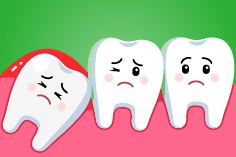Q&A with Dr. Jeff: What's the deal with wisdom teeth?
Posted on June 1, 2023 in Healthy You

If your dentist recommends wisdom teeth removal surgery, you probably have many questions. My teeth don’t hurt, so why do I need them removed? What if I choose to delay the procedure? How many days will I need to recover?
Here, Dr. Jeffrey Chaffin, Chief Dental Officer at Delta Dental of Iowa, helps boost your knowledge on wisdom teeth in this Q&A.
Q: Why are wisdom teeth removed?
Dr. Chaffin: It’s important to know that not all wisdom teeth have to be removed. For some, the wisdom teeth may erupt into the mouth normally and be fully functional – but that is rare. Many wisdom teeth erupt into the mouth partially and/or at strange angles. When this happens, it’s very difficult to properly clean the teeth over a lifetime, and these mispositioned teeth can cause problems like infections. That’s why providers recommend removing those teeth.
Q: How do I know if my wisdom teeth need to be removed?
Dr. Chaffin: Your dentist will help guide you in these decisions, but for most, the removal of wisdom teeth is elective and not emergent (that is, it’s a voluntary procedure and not one that is urgently needed to protect your health). Dental X-rays help monitor the development of the wisdom teeth and their eruption through the gum line.
If you experience pain and infection in the eruption area, those wisdom teeth will need to be removed sooner versus later. When these teeth erupt, they are often covered with some gum tissue that may be infected. This local infection will often clear up with treatment, but will also often return because of the difficulty to properly clean the area.
Given this information, many choose to have wisdom teeth removed earlier, as there are fewer surgical complications for younger people compared to older adults. When wisdom teeth are removed earlier in life, the wisdom tooth roots may not be fully developed and the jawbone may be less dense, making both removal and healing easier. Delaying these extractions until later in life can result in slower healing and a higher percentage of post-surgical complications.
Q: How should I prepare for my wisdom teeth removal procedure?
Dr. Chaffin: The preparation for the tooth removal depends on whether you are having local anesthesia or a form of sedation (eg, you’re “asleep” during the procedure). Local anesthesia does not require anything special in terms of your procedure preparation. But most people choose sedation for comfort, and you can’t have anything to eat or drink 8 hours prior to your surgery with this form of anesthesia.
Q: What can I expect during my wisdom teeth removal procedure?
Dr. Chaffin: Because most patients have their wisdom teeth removed under sedation, you will be unaware of most of the wisdom teeth removal experience. The dental team will focus on making you comfortable, and monitoring equipment will be used for your safety. The surgeon will also use a local anesthesia, so your extraction areas (and likely most of your mouth and lips) will be numb for much of the day after surgery.
Q: Are there any risks or complications associated with wisdom teeth removal?
Dr. Chaffin: There are risks with any surgery, and your dental provider will go into detail on those risks. The main risk for the upper wisdom teeth is a communication between the extraction site and the sinus, as the sinus is just above the nerve roots of those teeth. If this happens, the dental team will provide appropriate treatment and this normally heals nicely, but you may need to avoid blowing your nose for a few days following surgery.
For the lower teeth, one major risk is numbness of the lower lip. There is a nerve that feeds the lower lip, chin and tongue under the wisdom teeth. Your surgeon will talk about this, and X-rays will show how close the nerve is to those teeth. Both the sinus exposure and nerve issue are possible complications, but they are rare.
Q: What are some tips to ensure a smooth recovery from a wisdom teeth extraction?
Dr. Chaffin: You will want to maintain a low profile for a few days after the teeth have been removed. Rest is important, along with following the post-operative instructions provided by your dental team. The general recovery period is three to five days, but you could have some discomfort for a week or two.
Q: What happens if I avoid having my wisdom teeth removed?
Dr. Chaffin: Some people do choose a wait-and-see approach to their wisdom teeth. This can work for some, but you need to understand the risk associated with waiting. If wisdom teeth must be removed later in life, the post-surgery healing often takes longer and the complication rate is higher.
If you’re hesitant about having your wisdom teeth removed, it’s important you have a frank and open discussion about your concerns with your dentist. Any surgery can seem scary – and there are risks with all surgeries – but there are also risks in delaying needed treatment.